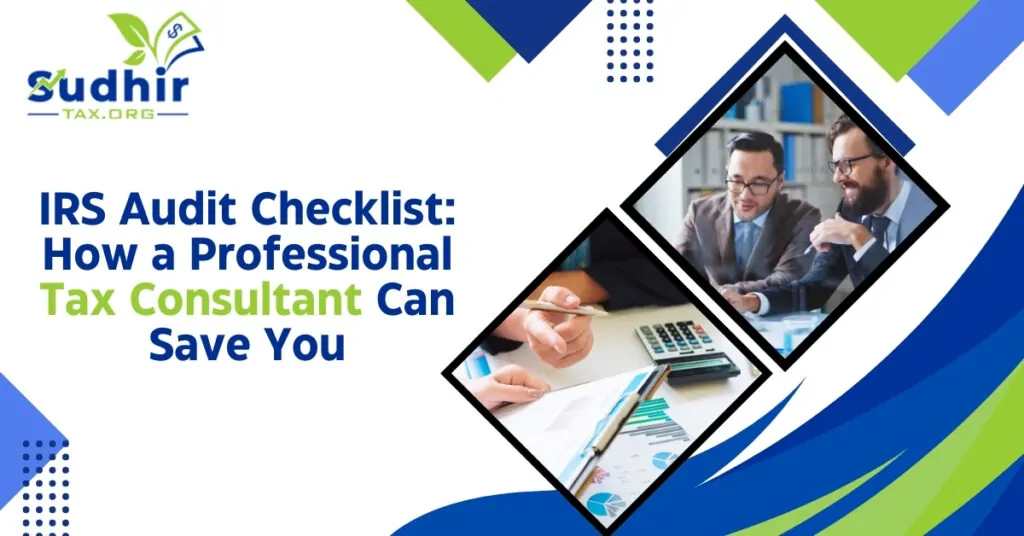Table of Contents
ToggleUnderstanding the Importance of an IRS Audit Checklist
When the IRS decides to audit your tax return, it can feel overwhelming and stressful. An IRS audit is essentially a detailed review of your financial records to confirm the accuracy of the information you provided in your tax filings. For individuals and businesses alike, this process can be intimidating because even minor errors or discrepancies can result in penalties, additional tax liabilities, or long legal procedures. This is where an IRS audit checklist becomes valuable. It helps taxpayers organize documents, confirm compliance, and avoid mistakes. However, simply having a checklist is not enough; understanding how to use it effectively with the help of a professional tax consultant can make the difference between a smooth audit and a stressful ordeal.
What Triggers an IRS Audit
An IRS audit is not always random. Several red flags can attract the attention of the IRS and trigger further scrutiny. Common reasons include unreported income, excessive deductions, unusually high charitable donations, mismatched records between tax filings and third-party reports, or large cash transactions. Self-employed professionals, gig workers, and business owners often face higher chances of audits due to the complexity of their finances. By being aware of these triggers and ensuring accuracy in tax returns, taxpayers can significantly reduce the risk of audits. A professional tax consultant not only helps you understand what may cause an audit but also ensures that your tax filings are prepared in compliance with IRS standards to avoid such red flags.
The Essential IRS Audit Checklist
A proper IRS audit checklist involves gathering and organizing all relevant financial documents before the audit process begins. This typically includes W-2 and 1099 forms, bank statements, receipts for deductible expenses, investment records, property ownership details, business expense documentation, and proof of charitable donations. The IRS may also ask for detailed records of international transactions or foreign bank accounts if applicable. Having all these documents organized in advance not only saves time but also demonstrates to the IRS that you are cooperative and transparent. The challenge, however, is knowing which documents are necessary and how to present them in a way that supports your case. This is where the role of a professional tax consultant becomes invaluable.

How a Professional Tax Consultant Helps During an Audit
A professional tax consultant brings expertise and experience that most individuals simply do not possess. They understand the intricacies of IRS audit procedures and know exactly how to prepare the required documentation. Consultants can identify gaps in records, spot inconsistencies, and address them before presenting information to the IRS. In addition, they act as representatives, meaning you do not have to face the IRS directly. Instead, your consultant communicates on your behalf, ensuring that your interests are protected throughout the audit. This not only reduces the stress of the situation but also minimizes the likelihood of mistakes during interactions with the IRS.
Protecting Against Penalties and Interest
One of the greatest risks of an IRS audit is the possibility of penalties and interest charges for inaccuracies or underreporting. Even honest mistakes can be costly if they result in the IRS determining that taxes were underpaid. A tax consultant ensures that your financial records are accurate and compliant, helping you avoid penalties. If there are issues in your filings, a consultant can help negotiate with the IRS to minimize penalties, establish payment plans, or even settle the debt under specific programs designed to assist taxpayers. Their knowledge of tax law and experience in dealing with the IRS can often save you significant amounts of money that you might otherwise lose through errors or lack of representation.
The Advantage of Professional Representation
Facing the IRS alone can be intimidating, especially if you are unfamiliar with tax law or audit procedures. A professional tax consultant not only provides technical expertise but also acts as a buffer between you and the IRS. This reduces the pressure of direct questioning and ensures that only necessary and accurate information is provided. Consultants are trained to answer IRS questions in a way that is truthful but also protective of your legal rights. Without representation, you might unintentionally provide information that complicates your situation. With a consultant by your side, the process becomes more structured, professional, and less stressful.
Long-Term Benefits of Working With a Tax Consultant
The role of a tax consultant goes beyond simply handling an IRS audit. Once the audit is completed, consultants provide valuable insights into how to manage your taxes more effectively in the future. They can help you implement better record-keeping practices, ensure compliance with evolving IRS regulations, and identify tax-saving strategies that reduce your liabilities going forward. By working with a consultant, individuals and businesses can maintain financial health, avoid repeat audits, and gain peace of mind knowing that their taxes are managed properly.
Building Confidence in Financial Compliance
An IRS audit can damage the confidence of taxpayers, making them more cautious about their financial reporting. By following a clear checklist and working with a consultant, however, you can turn this challenge into an opportunity. Audits do not always end with penalties—many taxpayers emerge with a stronger understanding of their finances and better compliance practices. A consultant ensures that your filings are both accurate and optimized, giving you confidence not only during the audit but also in future tax seasons. This professional guidance transforms the audit process from a burden into a valuable learning experience that strengthens your financial management.

Conclusion
An IRS audit may feel overwhelming, but with the right preparation and professional guidance, it does not have to become a nightmare. By following a structured IRS audit checklist and working with a seasoned tax consultant, you can ensure accuracy, compliance, and peace of mind throughout the process. A professional tax consultant protects you from penalties, represents your interests before the IRS, and provides long-term strategies for better tax management. When you partner with experts such as Sudhir Tax Private Limited, you gain more than audit support—you gain a trusted advisor who ensures your financial stability and compliance for years to come.
FAQs About IRS Audits and Consultants
Ans. You should gather tax returns, W-2s, 1099s, bank statements, expense receipts, investment records, and any documents supporting deductions or credits.
Ans. Yes, you can represent yourself, but it is risky. A professional tax consultant understands the process and ensures compliance, minimizing penalties and errors.
Ans. The length of an audit depends on its complexity. Some audits are resolved quickly, while others can take months. Having organized records and professional support speeds up the process.
Ans. Yes, consultants can often negotiate reduced penalties, set up payment arrangements, and ensure that you benefit from relief programs when eligible.









